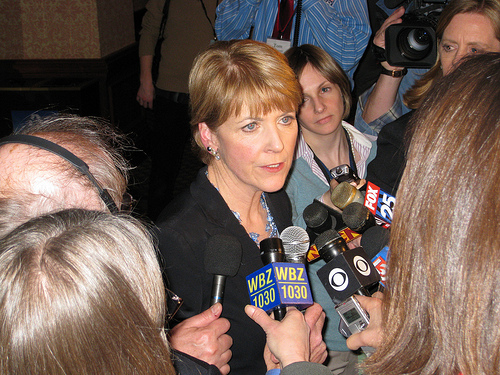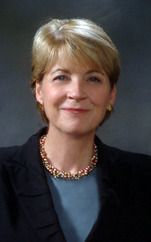I’m heading in to Boston in a bit to cover the first televised Massachusetts Senate debate, which will be moderated by political analyst Jon Keller. I’ll be posting a few observations here during the debate.
6:48 p.m. The media are set up in a second-floor conference room. There’s a flat-panel TV at one end of the room, which presumably will come on in a few minutes.
6:55 p.m. Moderator Jon Keller pops up five minutes early, then stops. The debate will be shown at 7 p.m. at wbz.com and wbztv.com.
7 p.m. The music is coming on.
7:03 p.m. Here we go. The debate is being broadcast on C-SPAN as well.
7:09 p.m. Good first question from a viewer — Massachusetts health-care reform has cost more than expected. What lessons can we learn? The Republican candidate, state Sen. Scott Brown, sort of deflects the question and says he would vote against the federal health-care-reform bill.
The Democrat, Attorney General Martha Coakley, explains why she’ll vote yes. “I think the plan will be good for Massachusetts.” The independent, Joe Kennedy, criticizes the Massachusetts system as being the most expensive in the country. “We should have addressed costs first,” Kennedy says.
Brown: “My role … is to look out for the interests of this state.” Coakley: “”They’re complementary plans. They don’t compete with each other.”
Kennedy: One of the premises of the Massachusetts plan was to control costs, and it hasn’t worked. “We’re going to end up bankrupting the country,” he says.
7:10 p.m. A weird question from a female viewer, who compares abortion coverage to Viagra coverage. Are those really analogous?
Brown claims Coakley has flip-flipped on her promise to vote against health-care reform if it restricts abortion rights. (She now says she’ll vote for the bill.) Coakley calls it “a compromise process,” but doesn’t really address abortion rights.
7:14 p.m. In response to a question on cash-for-clunkers, Kennedy says taxpayers spent $24,000 for every $8,000 that went into buying cars — then says he has no idea if those numbers are correct. Thanks for sharing, Joe. (Note: Media Nation commenter @Harrybosch finds that Kennedy got it right.)
7:20 p.m. We seem to be on to Keller’s questions rather than those submitted by viewers. Good. In response to a question about taxes, Brown says, “I’m in favor of lowering taxes and creating jobs … and putting more money in people’s pockets.”
Coakley responds by saying most tax cuts in recent years have gone to the top 1 percent to 2 percent of earners — “between the haves and the have-mores.” Kennedy comes out in favor of the income-tax cut that was on the state ballot last year, and says Brown opposed it.
Brown: Coakley is in favor of $2.1 trillion in taxes. Coakley: Brown is talking about investments necessary to come out of an economic recession. Kennedy: “The problem here is spending.”
7:25 p.m. Keller asks Coakley what would be sufficient provocation for war. Coakley essentially responds it would have to be an attack on the U.S., Western Europe or Israel. Kennedy sort of says the same thing. Brown says America is good.
7:28 p.m. Brown goes on to note that he supports President Obama’s escalation in Afghanistan, unlike Coakley, who, in turn, says, “I just don’t think we can be successful.” Kennedy adds putting our troops in “harm’s way ought to be done with the utmost thoughtfulness.” Kennedy says the original mission in Afghanistan has been “completed,” and the current mission is “undefined.”
Brown: We need to prevent the Taliban from working with Al Qaeda and to stop nuclear weapons from falling into the wrong hands. Brown adds Obama needs the “tools and resources” to carry out his mission.
Kennedy says we can defend Pakistan without having a full-scale occupation of Afghanistan.
7:30 p.m. We’re in another break. My quick impression is that we’re having an intelligent, substantive debate among three politicians with widely differing philosophies. At least in terms of being able to deliver a credible performance, Kennedy has proven he belongs with Coakley and Brown.
7:34 p.m. The candidates are talking about children, who, as we know, are the future. Snarkiness aside, it’s an important issue, and I’m sorry to report I haven’t heard anything worth passing along.
7:37 p.m. Kennedy is really causing Brown some problems, saying that Brown supported former governor Mitt Romney in approving $1 billion in tax increases. Not quite sure what Kennedy means, though when it swings back to him, he talks about penalties that people have to pay if they don’t have health insurance.
7:40 p.m. Keller asks a question from @dankennedy_nu (hey, that’s me) as to whether a senator should reflect the views of his or her constituents or exercise independent judgment. I don’t think I’m being unfair by observing that Brown responds by saying he’ll do both, and that Coakley ignores the question. Kennedy says he’ll listen to his constituents, but he doesn’t really answer the question, either.
Brown: “Martha isn’t running against Bush and Cheney, she’s running against me.”
7:44 p.m. Neither Coakley nor Brown has an iota of charisma. If the polls are to believed, Coakley doesn’t need it, and Brown does. Kennedy actually comes across as a bit more engaging. Kennedy keeps challenging Brown on whether he truly supports spending cuts — just deadly. He’s stealing Brown’s lunch right off his plate. He even challenges Brown to put his voting record online.
7:47 p.m. Oh, this is good — Keller asks what the candidates do when they’re approached by panhandlers. I like Coakley’s answer: no. She says she’d rather they take advantage of the safety net.
Kennedy: “When individuals approach me, I offer to buy them a sandwich.” And he walks with them to make sure they do it.
Brown: I’ve given money, coffee and sandwiches. Gov. Deval Patrick has cut the non-profits that Coakley refers to. They’re hurting because of higher taxes and not enough jobs.
7:49 p.m. Coakley goes after the Boston Herald for a story she says was wrong and that it retracted. I confess I don’t know what she’s referring to. If a Media Nation reader has something on that, please post it in the comments. (Ask and ye shall receive. Commenter @Rich tracks it down.)
7:52 p.m. This is very impressionistic, and maybe it’s just me. But I think Kennedy is coming across a lot better than Brown in terms of stating a clear anti-government, anti-tax, anti-spending philosophy.
7:58 p.m. Keller closes by asking what caused 9/11. I love Kennedy’s answer: The 19 hijackers caused 9/11. (Given the way this live-blog is going, I guess I should remind everyone that Kennedy and I are not related.) Brown takes a shot at Coakley for supporting putting terrorists on trial in New York. Coakley doesn’t say much.
“We should not be providing taxpayer dollars to providing attorneys to represent these people in New York,” Brown says. Has he thought through the implications of what he’s saying? He also claims the money will be spent on those trials instead of the troops, an absurd allegation. Coakley calls him on it.
Coakley: “Protecting civil rights and holding people accountable” is what the Constitution requires.
8:36 p.m. Sorry for the abrupt cutoff. As soon as the debate was over, we all ran downstairs to interview the candidates. Probably the most notable quote was Brown’s saying of Coakley, “Martha’s a very nice lady, and I have great respect for her. But she’s wrong about policy.”
When Coakley was asked about the “nice lady” remark, she deflected any hint that she found it sexist, saying, “I don’t mind. I am a nice lady…. I try to be nice to my colleagues, and I don’t take any umbrage at it.”
Most of the press departed before Kennedy could have his close-up, but Boston Globe reporter Eric Moskowitz and I stuck around. I asked Kennedy if he were concerned that he might be hurting Brown’s chances of making a run at Coakley, given that both of them say they oppose taxes and spending.
“People have to vote their conscience,” he replied. “You have to look at people’s records when there’s nothing else.” He said state spending rose at twice the rate of inflation when Romney was governor, and that Brown never challenged him on that.
“If he hasn’t done it before,” Kennedy said, “I can’t believe he’s going to do it now.”




